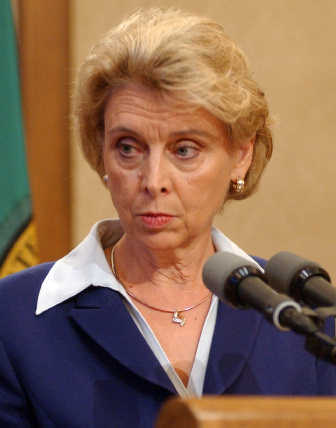One way or another, Washington voters may be asked to raise taxes in 2012 to bail the state out of a nearly $2 billion budget deficit.
Special interest groups have long been rumored to be targeting the 2012 ballot with citizen initiatives to raise taxes, and Gov. Chris Gregoire (D) wants the Legislature to go directly to the people as well, with a referendum to “temporarily” raise the state’s sales tax.
“After three years of cutting, now is the time to invest in a better future for all Washingtonians—for all of us to take responsibility, and, yes, spend a half-penny more,” Gregoire said in announcing her support for raising the sales tax. “I believe Washingtonians will stand with me. I believe they are tired of tearing down the services our parents and grandparents built—services that reflect the special values of Washington State.”
Hundreds of Millions More
According to the Washington Department of Revenue, increasing the state sales tax rate from 6.5 percent to 7.0 percent, as proposed by the governor, would generate an additional $494 million in Fiscal Year 2013, $522 million in Fiscal Year 2014, and $567 million in Fiscal Year 2015.
Gregoire is also asking lawmakers to consider other tax increases worth an additional $341 million, though her focus is on the sales tax increase as being the most politically viable.
Opposition to the proposal, however, has been bipartisan.
“Creating jobs is a far better approach than the Democrat plan to raise taxes on people and employers when they can least afford it,” said House Minority Leader Richard DeBolt (R-Chehalis). “House Republicans believe we should establish priorities of government to fund education, protect the most vulnerable, and keep our communities safe. Instead Democrats have tied these essential services to a tax increase. Clearly we don’t share the same priorities.”
Opposition from ‘Roadkill Caucus’
Members of the self-proclaimed fiscally conservative Democrat “Roadkill Caucus” are also saying more reforms are needed before tax increases can be considered.
“If we’re going to have sustainability over what many of us see as maybe a six to ten year rocky period, then we simply can’t say ‘okay we just need to raise revenue and then we’re done,” Rep. Deb Eddy (D-Kirkland) told KUOW (NPR) news radio.
“We’re going to ask them to vote for more taxes, whether they be more sales tax or other taxes,” Sen. Jim Kastama (D-Puyallup) also told KUOW. “We’re going to have to tell them that we won’t be back here next session asking for the same thing and threatening to cut those same programs again.”
The “Roadkill Caucus” gets its name from members’ belief they’ve been run over by elected officials on the right and the left of the political spectrum.
More Income, Higher Taxes?
Some tax hike proponents have argued state revenue hasn’t kept pace with the growth of personal income in the state, meaning there is room for a higher tax burden. This belief has drawn sharp criticism from public policy experts such as Paul Guppy, vice president of research for the Washington Policy Center.
“The rise in personal incomes is irrelevant to what state revenue should be. If people are doing better in their lives, why should the state automatically get a cut [of the increase in personal incomes]? That view sees government as a business—it grows in relation to people’s perceived ability to pay, not based on real public need,” said Guppy.
“Raising the financial burden of government based on average income is pretty tough on people living with billionaire neighbors like Bill Gates and Paul Allen. An unemployed person’s income might drop to zero, but the statewide average increased,” Guppy said.
The next step in this tax debate began unfolding when lawmakers convened for the 2012 Legislative session in January.
Jason Mercier ([email protected]) is director of the Center for Government Reform at the Washington Policy Center.




